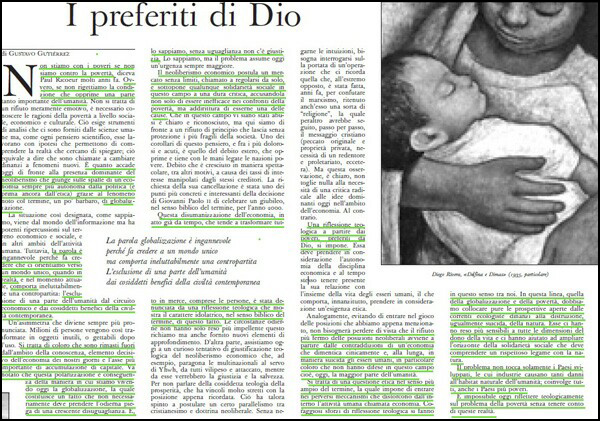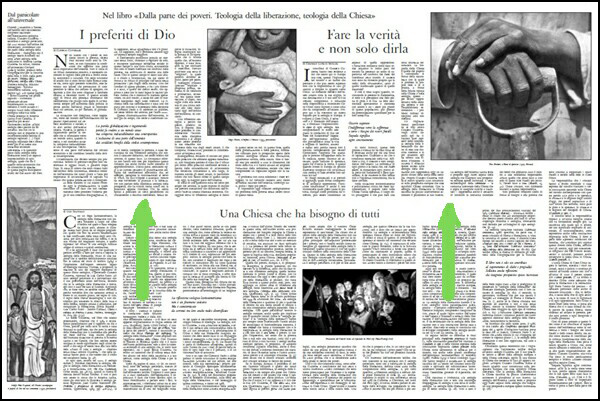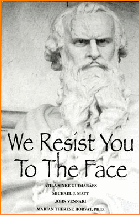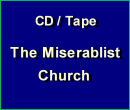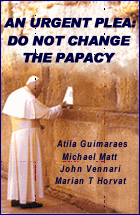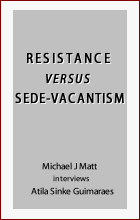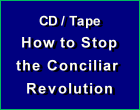Documents for your files
 |
PROGRESSIVIST DOCUMENT OF THE WEEK
L'Osservatore Romano Endorses
the Liberation Theology of Gustavo Gutierrez
the Liberation Theology of Gustavo Gutierrez
In its September 4, 2013 issue, pages 4 & 5, the organ of the Holy See, L'Osservatore Romano, published an article by Fr. Gustavo Gutierrez, considered the father of Liberation Theology. To not leave any doubt about its official endorsement of the ideas of Gutierrez, the Vatican paper also published - immediately after and under the same headline - an article by Archbishop Gerhard Ludwig Müller, the Prefect of the Congregation for the Doctrine of the Faith, praising Gutierrez. The two articles were placed side-by-side as shown in the two-page photocopy in the last row below.
Today, we offer our readers a photocopy of Gutierrez' article with our translation of the highlighted parts. Next Saturday we will highlight the article by Archbishop Müller.
In his article, Gutierrez reaffirms his Marxist-oriented criticism of Capitalism, renamed 'economic neo-liberalism,' and points to a hope for the future represented by Ecology, which he predicts will take on the fight against Capitalism's supposed abuses against nature along with its abuses against the poor.
Below, we present a photocopy of the article in L'Osservatore Romano. This document is preceded by our translation from the Italian, in blue, of the parts marked in green in the original.
Today, we offer our readers a photocopy of Gutierrez' article with our translation of the highlighted parts. Next Saturday we will highlight the article by Archbishop Müller.
In his article, Gutierrez reaffirms his Marxist-oriented criticism of Capitalism, renamed 'economic neo-liberalism,' and points to a hope for the future represented by Ecology, which he predicts will take on the fight against Capitalism's supposed abuses against nature along with its abuses against the poor.
Below, we present a photocopy of the article in L'Osservatore Romano. This document is preceded by our translation from the Italian, in blue, of the parts marked in green in the original.
From the book Taking the part of the poor.
Liberation Theology, Church theology
God's favorites
Gustavo Gutierrez
We are not with the poor if we are not against poverty. (…) That is, if we do not reject the condition that oppresses a significant part of humanity. (…) This is what is happening today in face of the dominant presence of neo-liberalism which appears behind an economy increasingly more independent from politics (and even more from ethics), thanks to the phenomenon known as (…) globalization.
(…) This word is misleading because it induces one to believe that we are heading toward one single world, when, in reality, (…) it entails the exclusion of a part of humanity from the economic circuit and so-called benefits of contemporary civilization.
(…) This refers to those left outside of the scope of knowledge, a decisive element of today's economy and a top priority for the accumulation of capital. It should be noted that this polarization is a consequence of the way today we are living globalization, which should not necessarily take on the modern plague of an increasing inequality. And, we know, without equality there is no justice. (…)
This economic neo-liberalism requires a market without limits that regulates itself and severely criticizes any social solidarity in this field, accusing it not only of being ineffective against poverty, but also of being one of its causes (…)
This dehumanization of the economy - going on for some time now – that tends to transform everything into merchandise, including the person, has been denounced by a theological reflection as idolatrous, in the biblical sense of the word. (…)
A theological reflection departing from the poor, God's favorites, must be made. (…)
We must not lose sight of the fact that the strongest refutation of neo-liberal positions comes from the contradictions of an economy that cynically forgets - in the long run and in a suicidal way - human beings, particularly those who have no defense in this area, that is to say, the majority of mankind.
It is an ethical question in the broadest sense of the term, which obliges us to enter into the perverse mechanisms that distort from within this human activity called the economy. In this regard, courageous efforts of theological reflection have been made among us. Regarding globalization and poverty, we must also place the prospects opened by ecological currents that face the destruction of nature, equally suicidal. They have made us more sensitive to all the dimensions of the gift of life and have helped us expand the horizon of social solidarity, which must include a respectful relationship with nature.
The problem does not only affect developed countries, whose industries cause so much harm to the natural habitat of man; it affects all countries, even the poorest. Today, it is impossible to reflect theologically on the problem of poverty without taking these realities into consideration.
Liberation Theology, Church theology
God's favorites
Gustavo Gutierrez
We are not with the poor if we are not against poverty. (…) That is, if we do not reject the condition that oppresses a significant part of humanity. (…) This is what is happening today in face of the dominant presence of neo-liberalism which appears behind an economy increasingly more independent from politics (and even more from ethics), thanks to the phenomenon known as (…) globalization.
(…) This word is misleading because it induces one to believe that we are heading toward one single world, when, in reality, (…) it entails the exclusion of a part of humanity from the economic circuit and so-called benefits of contemporary civilization.
(…) This refers to those left outside of the scope of knowledge, a decisive element of today's economy and a top priority for the accumulation of capital. It should be noted that this polarization is a consequence of the way today we are living globalization, which should not necessarily take on the modern plague of an increasing inequality. And, we know, without equality there is no justice. (…)
This economic neo-liberalism requires a market without limits that regulates itself and severely criticizes any social solidarity in this field, accusing it not only of being ineffective against poverty, but also of being one of its causes (…)
This dehumanization of the economy - going on for some time now – that tends to transform everything into merchandise, including the person, has been denounced by a theological reflection as idolatrous, in the biblical sense of the word. (…)
A theological reflection departing from the poor, God's favorites, must be made. (…)
We must not lose sight of the fact that the strongest refutation of neo-liberal positions comes from the contradictions of an economy that cynically forgets - in the long run and in a suicidal way - human beings, particularly those who have no defense in this area, that is to say, the majority of mankind.
It is an ethical question in the broadest sense of the term, which obliges us to enter into the perverse mechanisms that distort from within this human activity called the economy. In this regard, courageous efforts of theological reflection have been made among us. Regarding globalization and poverty, we must also place the prospects opened by ecological currents that face the destruction of nature, equally suicidal. They have made us more sensitive to all the dimensions of the gift of life and have helped us expand the horizon of social solidarity, which must include a respectful relationship with nature.
The problem does not only affect developed countries, whose industries cause so much harm to the natural habitat of man; it affects all countries, even the poorest. Today, it is impossible to reflect theologically on the problem of poverty without taking these realities into consideration.
